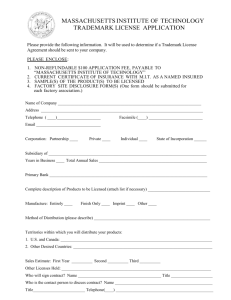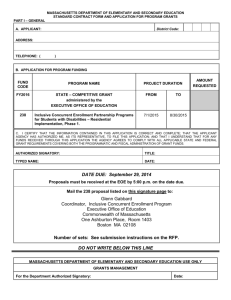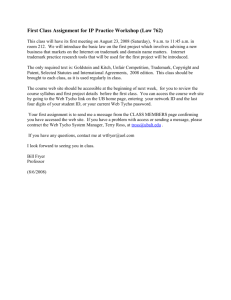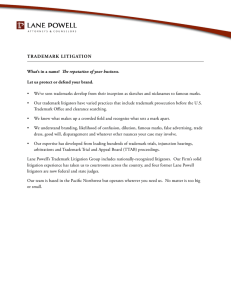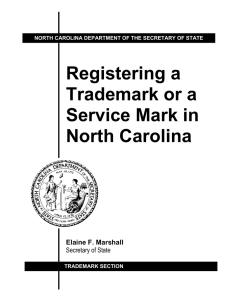L W AWYERS EEKLY
advertisement
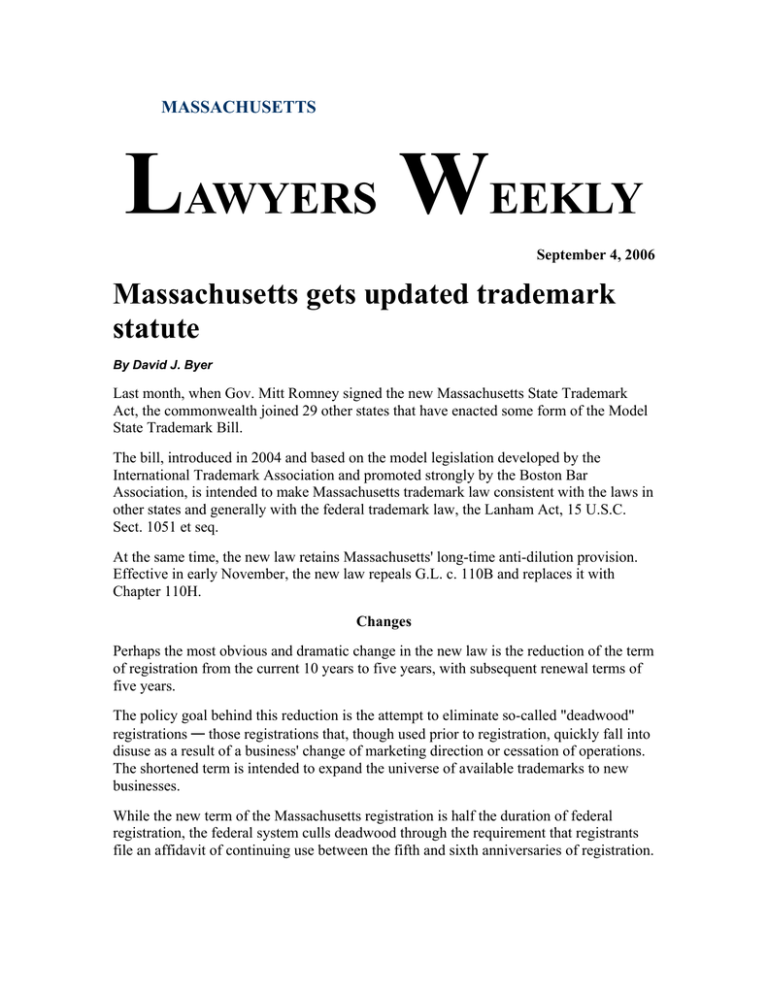
MASSACHUSETTS LAWYERS WEEKLY September 4, 2006 Massachusetts gets updated trademark statute By David J. Byer Last month, when Gov. Mitt Romney signed the new Massachusetts State Trademark Act, the commonwealth joined 29 other states that have enacted some form of the Model State Trademark Bill. The bill, introduced in 2004 and based on the model legislation developed by the International Trademark Association and promoted strongly by the Boston Bar Association, is intended to make Massachusetts trademark law consistent with the laws in other states and generally with the federal trademark law, the Lanham Act, 15 U.S.C. Sect. 1051 et seq. At the same time, the new law retains Massachusetts' long-time anti-dilution provision. Effective in early November, the new law repeals G.L. c. 110B and replaces it with Chapter 110H. Changes Perhaps the most obvious and dramatic change in the new law is the reduction of the term of registration from the current 10 years to five years, with subsequent renewal terms of five years. The policy goal behind this reduction is the attempt to eliminate so-called "deadwood" registrations — those registrations that, though used prior to registration, quickly fall into disuse as a result of a business' change of marketing direction or cessation of operations. The shortened term is intended to expand the universe of available trademarks to new businesses. While the new term of the Massachusetts registration is half the duration of federal registration, the federal system culls deadwood through the requirement that registrants file an affidavit of continuing use between the fifth and sixth anniversaries of registration. In a similar vein, two other provisions of the new law are designed to eliminate inappropriately registered marks — abandoned and generic marks. Registrations are subject to cancellation in either circumstance. The new state law adopts the federal law's definition of "abandonment," which is the discontinuation of use with the intent not to resume. The failure to use for a period of two years is prima facie evidence of abandonment. The new law also makes clear that generic marks — that is, marks that have become generic for the goods or services with which they are used — are subject to cancellation. While these provisions focus on improving the quality of registered marks, other elements in the new law are designed to create higher standards for registerability and a procedure for the exchange of additional information about the proposed mark. The new law retains the traditional statutory bars to registration, such as mere descriptiveness, primarily geographical descriptiveness, likelihood of confusion, mistake or deception. The new law also requires the applicant to attest that, to the registrant's knowledge, "no other person has registered, either federally or in this state" an identical mark or a mark likely to cause confusion, mistake or deception. Moreover, the secretary of state, whose offices process trademark applications, is given the authority to require a statement from the applicant as to whether the applicant previously has filed an application for federal registration. If that federal application has been refused, the secretary of state is authorized to require the applicant to provide the reasons for the rejection. Applications for registration are reviewed by the secretary of state's office, and the new law makes it clear that the examination process allows the examiner to request supplemental information, amendments and disclaimers from the applicant. If the application is rejected, the secretary of state's office must provide the applicant with its reasons, and the applicant may reply to those arguments or amends its application. If the application is finally rejected, the applicant may seek a writ of mandamus from the Superior Court requiring registration. The secretary of state, who under the new law is given the authority to set application and renewal fees, now is in the process of creating its procedures to handle the changes in the law. Anti-dilution provision As under the old law, only registrants may sue for infringement under the new Massachusetts Trademark Law. This limitation is not carried over into the law's antidilution provision. In 1947, Massachusetts was the first state in the country to adopt trademark anti-dilution protection. Since that time, many other states and the federal government have followed suit. The new law preserves the broad language of the old statute: "Likelihood of injury to business reputation or of dilution of the distinctive quality of a mark registered under this Act, or a mark valid at common law, or a trade name valid at common law shall be a ground for injunctive relief notwithstanding the absence of competition between the parties or the absence of confusion as to the source of goods or services." This provision currently is broader than the federal statute, and thus may provide an aggrieved mark holder more easily obtainable relief. The provision covers "likelihood of injury to business reputation" as well as dilution, and it does not require "actual" dilution, as in the current federal law. While Chapter 110B allowed a plaintiff to seek all profits derived from and all damages incurred as a result of infringement, the new Chapter 110H also allows the court, in its discretion, to award the prevailing party up to three times such profits and damages and/or reasonable attorneys' fees "where the court finds the other party committed such wrongful acts with knowledge or in bad faith or otherwise as according to the circumstances of the case." Thus, under the new law, treble damages and attorneys' fees may be awarded without resort to Chapter 93A. Overall, the effect of the new law is to strengthen the commonwealth's trademark registration system and the trademark rights for those local businesses that avail themselves of state registration. Even companies that are eligible for and obtain federal registration may want to consider using the state system and state law to provide some extra arrows in their enforcement quiver, especially under the anti-dilution provision.
